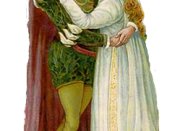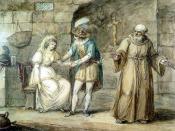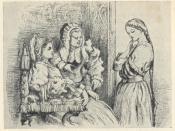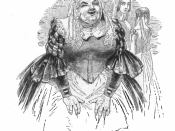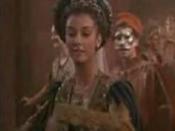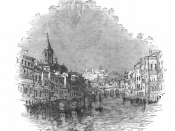"There were people all over, running and getting shot... Have you seen Saving Private Ryan? The first 10 minutes of that? That's what it was like...I checked this one kid, and I knew he was dead. I looked at the other kid, and he was moaning in pain and there was blood all over the place. He looked at me and half of his face was blown off. He just looked at me and like, I don't know...What do you say at that moment when someone's going to die?"ÃÂ recalls Nick Foss a student at Columbine High School during the shooting. Why do you think this tragic event occurred? Sure there are a number of reasons, but the main one was the choices made by those involved. Their peers chose to make fun of them because they were "different"ÃÂ and so those victims chose to do something about it. Life is full of decisions, some good and some bad.
In Romeo and Juliet by William Shakespeare, those characters ended up making many hard choices. The story of Romeo and Juliet is about two secret young lovers who belonged to two rival families and come into conflict with their parents. Therefore strategizing a dangerous plan so they can be together, which ends up costing them their lives. Romeo and Juliet's suicide was not guided by fate, but by choices which they themselves made that led them to their death.
First of all, Romeo acted on his first thoughts, which ended up fostering deadly decisions in the end. In the beginning, Romeo and Benvolio discuss whether or not they want to attend the Capulet's party.
Tut! you saw her fair, none else being by, Herself pois'd with herself in either eye; 2 But in that crystal scales let there be wigh'd Your lady's love against some other maid That I will show you shining at this feast, And she shall scant show well that now seems best.
Romeo replies, " I'll go along, no such sight to be shown,/ But rejoice in splendor of mine own"ÃÂ (I.ii. 92-99). Benvolio is explaining that if Romeo goes to the party he can compare Rosaline (who Romeo is in love with) to all the other women there and will prove that there are more beautiful women than her. Romeo accepts his offer, but only to see Rosaline, and not to meet other women there. Even though Romeo's choice is blinded with his love for Rosaline, he still chooses to attend the party. He has complete control over whether or not to go to the party, and should realize the consequences of going. Such as getting thrown out because of his family name. Or even something that never occurred to him, falling in love with someone else besides Rosaline, Juliet.
Again, love and also beauty blind Romeo when he sees Juliet for the first time: O, she doth teach the torches to burn bright! It seems she hangs upon the cheek of night As a rich jewel in an Ethiop's ear- Beauty too rich for use, for earth too dear! So shows a snowy dove trooping with crows As yonder lady o'er her fellows shows.
The measure done, I'll watch her place of stand And, touching hers make blessen my rude hand.
Did my heart love till now? Forswear it, sight! For I ne'er saw true beauty till this night (I.iiiii. 42-51).
Romeo compares Juliet to jewels, and he decides that he will go to where she goes after this dance. This is because of the fact that she is so beautiful that he's in love. Seeing Juliet was his way out from his heartache that Rosaline caused him. Romeo has no idea who she 3 is and has never even spoken to her, never the less he immediately says that he loves her. His choice to go meet her after the dance wasn't smart, because he was getting over Rosaline and was distracted because of this. He clinged to Juliet and became devoted too quickly.
Perhaps the biggest choice Romeo made was when he murdered Tybalt, Juliet's cousin. Benvolio reports to Romeo of Tybalts condition after the duel.
Romeo, away, be gone! The citizens are up, and Tybalt slain.
Stand not amazed. The Prince will doom thee death If thou art taken. Hence, be gone, away! (III.i.128-131).
Tybalt has just killed Mercutio (Romeo's good friend) and in return Romeo takes Tybalt's life and runs away. At first Romeo refuses to fight because Tybalt is Juliet's cousin, and they now are secretly relatives through marriage. Though eventually Romeo kills him and leaves his chances of the Capulet's accepting this marriage very slim. For this reason leaves his life threatened as well. Romeo was driven with so much hate that, like times before, he didn't think about his choice and just killed Tybalt.
Unlike Romeo, Juliet thinks about what actions she should take, but always ends up on the wrong path. When Romeo and Juliet finally meet, she stands on her balcony and speaks to herself about her feelings for him: `Tis but thy name that is my enemy.
Thou art thyself, though not a Montague.
What is a Montague? It is nor hand, nor foot Nor arm, nor face, nor any other part Belonging to a man. O, be some other name! What's in a name? That which we call a rose By any other word would smell as sweet...
4 Without that title. Romeo, doff thy name; And for thy name, which is no part of thee, Take all myself (II.ii. 38-45).
She says that only his name is her enemy and that a name isn't who you are. Romeo should remove his name, because her name is no part of her either. At first she isn't sure if it is right for her to fall in love with a Montague, because she knows that they are family enemies. Then she questions her morals that her parents have showed her and decides that it doesn't matter what his families name is, it matters who he is. She goes against not only her parent's morals but her whole families also. This isn't saying that these should be her own morals, but she has always been such a loyal child. If she did go against her parents morals then they would take everything to drastic measures. Choices should mainly be based on morals or else the decision probably went wrong somehow. Juliet did this by falling in love Romeo, who belonged to a hated family by the Capulet's, therefore making a troubled choice.
Juliet tells her father about her decision to marry Paris in order to get out of trouble with her love for Romeo.
Where I have learnt me to repent the sin Of disobedient opposition To you and your behests, and am enjoin'd By holy Lawrence to fall here To beg your pardon.? Pardon, I beseech you! Henceforward I am ever rul'd by you.
Capulet replies, "Send for the County. Go tell him of this./ I'll have this knot knit up tomorrow morning"ÃÂ (IIII.ii.17-24). Juliet apologizes to her father and kneels down to beg for his forgiveness. She is sorry that her father couldn't control her before, but now she is 5 willing to be controlled by him forever. Capulet is pleased and moves the wedding for Juliet and Paris to the next morning. She actually said that she would marry Paris and then following through with a fake death. This way she would be able to run away with Romeo, who has been exiled for the cause of Tybalts death. She could have just told her father that she wasn't in love with Paris and run off with Romeo knowing that her family would never accept their marriage. This was Juliet's worst decision, because this forced her to take a life threatening risk.
Another time she questions herself about what she is going to do is right, just before she takes the poison.
Farewell! God knows when we shall meet again...
Come, vial.
What if this mixture do not work at all?...
What if it be a poison which the friar Subtly hath minist'red to have me dead, Lest in this marriage he should be dishonor'd Because he married me before to Romeo?...
How if, when I am laid into the tomb, I wake before the time that Romeo Come to redeem me?...
To whose foul mouth no healthsome air breathes in, And there die strangled ere my Romeo comes?...
O, if I wake, shall I not be distraught, Environed with all these hideous fears, As with a club dash our my desp"ÃÂrate brains...
Romeo, Romeo, Romeo! Here's drink-I drink to thee (IIII.iii. 14-58).
She wonders what will happen if the poison doesn't even work, if the Friar is actually trying to kill her with it, because he would be blamed for marrying Romeo and Juliet, and if she wakes up before Romeo comes to rescue her. She also considers what will happen if she suffocates, or that she will go crazy and will bash her head with bones! The way that 6 Juliet questions herself so many times should help her realize that if she takes this potion there could be many awful outcomes and death. She does recognize this, though she sounds as if she is going insane the way she talks about bashing herself with bones in the tomb. She never answered any of her questions, which she should have, because the odds that nothing bad is going to come from her decision are small.
Lastly, there were some non-clever choices made by Romeo and Juliet, combined, that resulted in their deaths. After meeting Juliet, Romeo and the Friar discuss marriage plans.
Then plainly know my heart's dear love is set On the fair daughter of rich Capulet; As mine on hers, so hers is set on mine, And all combin'd, save what thou must combine By holy marriage. When and where and how We met, we wooed, and made exchange of vow, I'll tell thee as we pass, but this I pray, That thou consent to marry us today (II.iii. 57-64).
Romeo asks the Friar if he will marry Juliet and him because both of their hearts are set on each other. Realize that they decide to marry each other the very first day they meet! They are both completely rushing into things. They both choose to be partners for life, even considering that both of their families are hated enemies, which could cause major conflicts in the future.
Perhaps the worst choice they made was ignoring their visions and dreams. Romeo isn't quite sure on attending the Capulet's Party.
I fear, too early; for my mind misgives Some consequence yet hanging in the stars Shall bitterly begin his fearful date 7 With this night's revels and expire the term Of a despised life, clos'd in my breast, By some vile forfeit of untimely death (I.iiii. 106-113).
Romeo says that he has a vision that some event will occur at the party and lead to death. Juliet also has a mysterious vision right before Romeo leaves to where he has been exlied: O God, I have an ill-divining soul! Methinks I see thee, now thou art so low, As one dead in the bottom of a tomb.
Either my eyesight fails, or thou lookest pale (III.iiiii. 54-57).
These are both very accurate visions that Romeo and Juliet had, which they ignored. Because Romeo went to the party he met Juliet and in the end killed himself to be with her. Juliet also said that she pictured him dead in the bottom of a tomb. They didn't choose to go with their instinctual feelings, which cost them their lives.
Romeo and Juliet never escaped the consequences of their choices. After all, it was suicide and that was the biggest choice of all, they actually decided to kill themselves. If Romeo and Juliet had made different decisions then the play wouldn't have ended tragically. Know that you are in charge of your future, not anyone or anything else. It's your choice and not just chance which determines your destiny. Benjamin Franklin once said, "If passion drives you, let reason hold the reins."
